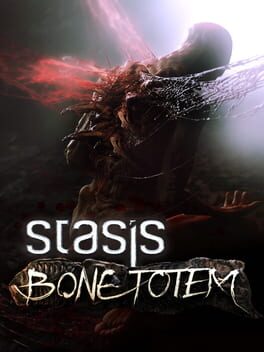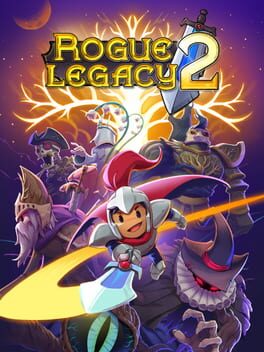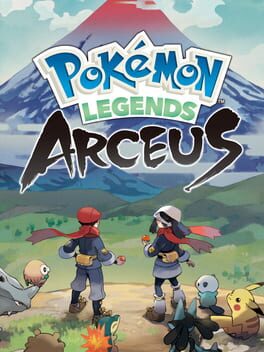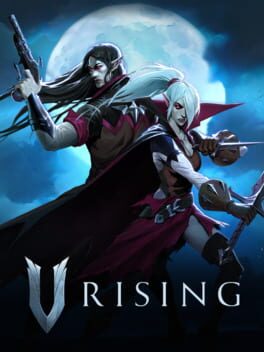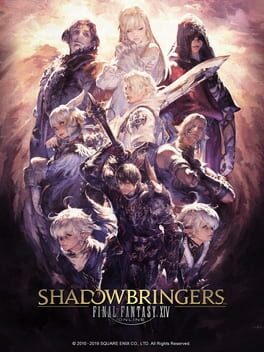EffieArtoria
6 Reviews liked by EffieArtoria
Stasis: Bone Totem
2023
I don’t want this to be an excessively scathing review, what The Brotherhood devs did here is an amazing work of love and I encourage them to pursue their vision as much as they can and at the best of their capabilities. Contrary to many horror games, those made of poor and cheap ideas thrown around for shock value to create the bare minimum Outlast-clone, Stasis Bone Totem is far more than competently made, with a clear image behind, engaging concepts, strong writing and intriguing puzzles, and the sum of each part is a chore to play.
For example, it’s a given apparently that point-and-click adventure games must have some sections with a sprawling, intertwined map where multiple interactions must be followed simultaneously to progress, at the risk of having maybe too much backtracking, unintuitive inventory puzzles and some areas that are visually less interesting than others. That is the entirety of this game.
There are so, so, so many screens to traverse that at one point I dreaded finding new places rather than feeling curious at what might expect me. In no small part because there are clear limits in what the map design could achieve with texture and effects alone, and so much of the impact was conveyed through written descriptions, of gore, flora, environments, decors and so on, and they are fine, evocative even, but there is just too much of them.
I don't think a horror game necessarily loses its spark when the danger and mystery behind it are solved, but there is a moment when the balance between subtext and text is broken in favour of the latter and, at that point, you start to think the game is actively wasting your time. Each time I found a new room and scanned it with the ping, ten new green points with no interactions but text would pop up and I shivered at the idea of having to find and read each of them. That’s not even mentioning what I felt whenever a new PDA showed up. The cardinal sin, however, is having entire areas devoid of anything but items to pick up or just descriptions; if a room is only there to make the player walk more from one puzzle to the other instead of offering anything worthwhile but text, that room should not be there in the first place.
Same goes for the dialogues between the characters, there are only amazing voice performances in the game, and the players will absolutely take note of that because the characters never ever shut up. Every minute, interesting thing in the game necessitates for them to actively react and describe, talk between each other about what’s clearly there in front of them and it’s excruciating. It’s fine in terms of showing their interactions, the family dynamics and how they feel in key moments, but again it’s just too much text, just let me find something disturbing and react to it before any of these berks have something to say about it.
Between the end of chapter 2 and the halfway point of chapter 3 I was detached from anything that was happening in the story. There had been some interesting twists, but I had to run around empty maps so much, between so much text and hearing so much of the same reactions and dialogue from the cast, that it made some of my favourite tropes (the underwater horror, being trapped in a sci-fi confinement, violent murder mysteries and the moral implications of what capitalism and religion do to people) felt cheap and overwritten.
Sometimes it felt like the developers knew this too, because there were many terminals and documents scattered around with barely any text or commentary but simply pictures of experiments and unknown lifeforms or old drawings of alien schematics, and they were just so much more effective precisely because there was no explanation or reaction.
Stasis Bone Totem is kind of worth the effort though, I kept going ‘til the end because this is the type of video game that needs to be made. Just last year we had Signalis and Iron Lung, among many others I certainly have not even heard of, and they did nail the feeling of being trapped, haunted, oppressed, helpless but having to move forward, and they clearly conveyed all these emotions through gameplay and very little with straightforward narration, because in such hostile and terrifying situations the mind can fill in the blanks immensely well. A lot of work was put into SBT, amazing and effective work, just too much work for the kind of experience, I think, it was going for.
For example, it’s a given apparently that point-and-click adventure games must have some sections with a sprawling, intertwined map where multiple interactions must be followed simultaneously to progress, at the risk of having maybe too much backtracking, unintuitive inventory puzzles and some areas that are visually less interesting than others. That is the entirety of this game.
There are so, so, so many screens to traverse that at one point I dreaded finding new places rather than feeling curious at what might expect me. In no small part because there are clear limits in what the map design could achieve with texture and effects alone, and so much of the impact was conveyed through written descriptions, of gore, flora, environments, decors and so on, and they are fine, evocative even, but there is just too much of them.
I don't think a horror game necessarily loses its spark when the danger and mystery behind it are solved, but there is a moment when the balance between subtext and text is broken in favour of the latter and, at that point, you start to think the game is actively wasting your time. Each time I found a new room and scanned it with the ping, ten new green points with no interactions but text would pop up and I shivered at the idea of having to find and read each of them. That’s not even mentioning what I felt whenever a new PDA showed up. The cardinal sin, however, is having entire areas devoid of anything but items to pick up or just descriptions; if a room is only there to make the player walk more from one puzzle to the other instead of offering anything worthwhile but text, that room should not be there in the first place.
Same goes for the dialogues between the characters, there are only amazing voice performances in the game, and the players will absolutely take note of that because the characters never ever shut up. Every minute, interesting thing in the game necessitates for them to actively react and describe, talk between each other about what’s clearly there in front of them and it’s excruciating. It’s fine in terms of showing their interactions, the family dynamics and how they feel in key moments, but again it’s just too much text, just let me find something disturbing and react to it before any of these berks have something to say about it.
Between the end of chapter 2 and the halfway point of chapter 3 I was detached from anything that was happening in the story. There had been some interesting twists, but I had to run around empty maps so much, between so much text and hearing so much of the same reactions and dialogue from the cast, that it made some of my favourite tropes (the underwater horror, being trapped in a sci-fi confinement, violent murder mysteries and the moral implications of what capitalism and religion do to people) felt cheap and overwritten.
Sometimes it felt like the developers knew this too, because there were many terminals and documents scattered around with barely any text or commentary but simply pictures of experiments and unknown lifeforms or old drawings of alien schematics, and they were just so much more effective precisely because there was no explanation or reaction.
Stasis Bone Totem is kind of worth the effort though, I kept going ‘til the end because this is the type of video game that needs to be made. Just last year we had Signalis and Iron Lung, among many others I certainly have not even heard of, and they did nail the feeling of being trapped, haunted, oppressed, helpless but having to move forward, and they clearly conveyed all these emotions through gameplay and very little with straightforward narration, because in such hostile and terrifying situations the mind can fill in the blanks immensely well. A lot of work was put into SBT, amazing and effective work, just too much work for the kind of experience, I think, it was going for.
Rogue Legacy 2
2020
Rogue Legacy 2 has a lot in common with Rogue Legacy, including its progression and level structure, but adds character classes and some NPCs to interact with between attempts. I didn't find much to like about these additions, unfortunately, and the sheer amount of stuff here feels like it completely breaks open some of the cracks in the original game's design. Although I think it is pretty fundamentally flawed from a systems and implementation perspective, Rogue Legacy 2 still plays fairly well -- it can be fun to just blast through a couple of runs.
There is more narrative than in the first game, but it didn't land for me at all. The story of the castle and bosses is expounded upon at every opportunity, but without successfully conveying anything about what is going on. It seems like it is trying to be mysterious, but it just feels like disjointed nonsense.
The added NPC characters have a lot to say, most of which is rote jokes that don't really land. I didn't find much to like about or care about in them. (Also, the game sticks with the idea that you play as a series of heirs, so... are these NPCs all immortal or something? Maybe it is explained in dialog that I skipped.)
There is so much writing in this game, but none of it does the baseline job of giving my character a reason to explore the castle or care.
Control is simple, with a jump, dash, and "kick flip" which can be used to bounce off of enemies. They all feel pretty responsive and dodging and navigating with these abilities is usually fairly easy.
Some implementation and style choices hamstring this for me, however. The complex rules about what can reset your dash and jump make it hard to track which are available to you at any given time and the lack of adequate forgiveness mechanics around the kick flip and jumps make them feel unresponsive during the most intense situations. Many of the attacks and enemies are hard to read -- hits often surprise you in a bad way.
Each of the classes you can play as has a unique weapon and ability, though I found I didn't like using many of them. Rogue Legacy 2 tries to incentivize using different classes by giving them mastery levels which reward passive bonuses, but like most of the upgrades in the game they are too granular to have much impact or be an incentive.
The bard, however, is a standout. They throw out musical notes which they can use the kick flip to jump off of and cause damage in an area. It changes how you think about the space and how combat works in a fun, expressive way. I would have loved more classes with this level of creativity and uniqueness.
Magic spells can mix things up a bit as well, but are mostly similar versions of a projectile or AoE effect.
On a run-to-run basis, the game adds variety through artifacts, which give you unique abilities or effects. Wildly, collecting these past a certain point reduces your max health (!?), actively disincentivizing you from doing the thing that might make your run varied and interesting. This feels like a decision made by someone who doesn't understand the genre. As in the first game, they seem to expect the permanent progression to be the thing that carries you through the game. However...
Although it is the core of Rogue Legacy 2, I found a lot of mechanical problems with the permanent progression systems.
There are a ton of upgrades to buy, paid for with money you earn on each run. They are intensely granular, so most of them just don't really matter except in aggregate. I found myself just buying whatever I could afford, rather than working towards goals and getting excited about upgrades.
Many of the upgrades are unclear or only have second order effects, which makes them unsatisfying. I can upgrade my rune capacity, but I have to buy runes to fill that capacity, so is it valuable right now? I can upgrade my total equipment weight, increasing the amount I can wear before I hit the Dark Souls-style weight breakpoints which only seem to affect how many artifacts I can pick up in the dungeon before they start reducing my max health, I guess? I can upgrade my focus to improve spell crits, but is the Wizard's regular attack a spell? I can buy and upgrade about 10 different types of equipment, but the benefits seem to be set-bonus based, so I can't tell what they are until I buy them all.
Even the most expensive upgrades (which aren't very exciting regardless) are removed as long-term goals by the Charon mechanic, which prevents you from saving up in any meaningful way. The game wants you to afford these with gold farming runs through easy parts of the castle, but I never felt motivated to do so and the fast travel to later areas makes this less than compelling.
The first game was small and simple enough that this progression system worked and farming runs made more sense. Here it has broken under the weight of everything else that is going on.
I had an ok time with Rogue Legacy 2, but it doesn't have enough variety between runs or sense of real progression to overcome the control and systemic flaws and make me want to keep playing it. If you were a massive fan of the first one, you may find a lot to like here, since it is basically just more and better, for some definition of better. If you just want a fun roguelike with great mechanics, play Hades, Binding of Isaac, or Spelunky.
There is more narrative than in the first game, but it didn't land for me at all. The story of the castle and bosses is expounded upon at every opportunity, but without successfully conveying anything about what is going on. It seems like it is trying to be mysterious, but it just feels like disjointed nonsense.
The added NPC characters have a lot to say, most of which is rote jokes that don't really land. I didn't find much to like about or care about in them. (Also, the game sticks with the idea that you play as a series of heirs, so... are these NPCs all immortal or something? Maybe it is explained in dialog that I skipped.)
There is so much writing in this game, but none of it does the baseline job of giving my character a reason to explore the castle or care.
Control is simple, with a jump, dash, and "kick flip" which can be used to bounce off of enemies. They all feel pretty responsive and dodging and navigating with these abilities is usually fairly easy.
Some implementation and style choices hamstring this for me, however. The complex rules about what can reset your dash and jump make it hard to track which are available to you at any given time and the lack of adequate forgiveness mechanics around the kick flip and jumps make them feel unresponsive during the most intense situations. Many of the attacks and enemies are hard to read -- hits often surprise you in a bad way.
Each of the classes you can play as has a unique weapon and ability, though I found I didn't like using many of them. Rogue Legacy 2 tries to incentivize using different classes by giving them mastery levels which reward passive bonuses, but like most of the upgrades in the game they are too granular to have much impact or be an incentive.
The bard, however, is a standout. They throw out musical notes which they can use the kick flip to jump off of and cause damage in an area. It changes how you think about the space and how combat works in a fun, expressive way. I would have loved more classes with this level of creativity and uniqueness.
Magic spells can mix things up a bit as well, but are mostly similar versions of a projectile or AoE effect.
On a run-to-run basis, the game adds variety through artifacts, which give you unique abilities or effects. Wildly, collecting these past a certain point reduces your max health (!?), actively disincentivizing you from doing the thing that might make your run varied and interesting. This feels like a decision made by someone who doesn't understand the genre. As in the first game, they seem to expect the permanent progression to be the thing that carries you through the game. However...
Although it is the core of Rogue Legacy 2, I found a lot of mechanical problems with the permanent progression systems.
There are a ton of upgrades to buy, paid for with money you earn on each run. They are intensely granular, so most of them just don't really matter except in aggregate. I found myself just buying whatever I could afford, rather than working towards goals and getting excited about upgrades.
Many of the upgrades are unclear or only have second order effects, which makes them unsatisfying. I can upgrade my rune capacity, but I have to buy runes to fill that capacity, so is it valuable right now? I can upgrade my total equipment weight, increasing the amount I can wear before I hit the Dark Souls-style weight breakpoints which only seem to affect how many artifacts I can pick up in the dungeon before they start reducing my max health, I guess? I can upgrade my focus to improve spell crits, but is the Wizard's regular attack a spell? I can buy and upgrade about 10 different types of equipment, but the benefits seem to be set-bonus based, so I can't tell what they are until I buy them all.
Even the most expensive upgrades (which aren't very exciting regardless) are removed as long-term goals by the Charon mechanic, which prevents you from saving up in any meaningful way. The game wants you to afford these with gold farming runs through easy parts of the castle, but I never felt motivated to do so and the fast travel to later areas makes this less than compelling.
The first game was small and simple enough that this progression system worked and farming runs made more sense. Here it has broken under the weight of everything else that is going on.
I had an ok time with Rogue Legacy 2, but it doesn't have enough variety between runs or sense of real progression to overcome the control and systemic flaws and make me want to keep playing it. If you were a massive fan of the first one, you may find a lot to like here, since it is basically just more and better, for some definition of better. If you just want a fun roguelike with great mechanics, play Hades, Binding of Isaac, or Spelunky.
V Rising
2022
Writing as a PvE Co-op exclusive player.
Survival games in this format are nothing short of miserable. There are no forks in progression and you have one singular goal at any time. This singular goal usually entails grinding the same subset of enemies or scouring for resources for hours at a time. People generally praise this game for the combat, which is mostly good but sometimes frustrating. Nothing new if you're familiar with Battlerite. You get a lot of abilities and spells but they range from useless to redundant. The sunlight mechanic is exclusively annoying. The boss battles, specifically at the end of the game, are the highlights. It doesn't justify the games flaws for me though.
There are many features that exist for PvP alone, so when carried over into PvE the game gets 100x more insufferable. If you play PvE it is a necessity that you enable warping with items and disable durability.
I do not imagine there is a world where playing this game solo is a good idea. Friends make it tolerable.
Survival games in this format are nothing short of miserable. There are no forks in progression and you have one singular goal at any time. This singular goal usually entails grinding the same subset of enemies or scouring for resources for hours at a time. People generally praise this game for the combat, which is mostly good but sometimes frustrating. Nothing new if you're familiar with Battlerite. You get a lot of abilities and spells but they range from useless to redundant. The sunlight mechanic is exclusively annoying. The boss battles, specifically at the end of the game, are the highlights. It doesn't justify the games flaws for me though.
There are many features that exist for PvP alone, so when carried over into PvE the game gets 100x more insufferable. If you play PvE it is a necessity that you enable warping with items and disable durability.
I do not imagine there is a world where playing this game solo is a good idea. Friends make it tolerable.
Gris
2018
I saw Emet-Selch at a grocery store at the Crystarium yesterday. I told him how cool it was to meet him in person, but I didn’t want to be a douche and bother him and ask him for photos or anything. He said, “Oh, like you’re doing now?” I was taken aback, and all I could say was “Huh?” but he kept cutting me off and going “huh? huh? huh?” and closing his hand shut in front of my face. I walked away and continued with my shopping, and I heard him chuckle as I walked off. When I came to pay for my stuff up front I saw him trying to walk out the doors with like twelve calamities in his hands without paying.
The girl at the counter was very nice about it and professional, and was like “Sir, you need to pay for those first.” At first he kept pretending to be tired and not hear her, but eventually turned back around and brought them to the counter.
When she took one of the calamities and started scanning it multiple times, he stopped her and told her to scan them each individually “so that we may proceed to the final judgement,” and then turned around and winked at me. I don’t even know what that means. After she scanned each one and put them in a bag and started to say the price, he kept interrupting her by yawning really loudly.
The girl at the counter was very nice about it and professional, and was like “Sir, you need to pay for those first.” At first he kept pretending to be tired and not hear her, but eventually turned back around and brought them to the counter.
When she took one of the calamities and started scanning it multiple times, he stopped her and told her to scan them each individually “so that we may proceed to the final judgement,” and then turned around and winked at me. I don’t even know what that means. After she scanned each one and put them in a bag and started to say the price, he kept interrupting her by yawning really loudly.
